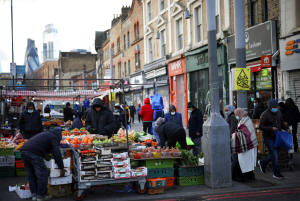UK's high inflation cools, offering some relief to Bank of England
 Send a link to a friend
Send a link to a friend
 [July 19, 2023] By
William Schomberg and Andy Bruce [July 19, 2023] By
William Schomberg and Andy Bruce
LONDON (Reuters) -Britain's high rate of inflation fell by more than
expected in June and was its slowest in over a year at 7.9%, according
to data that will ease some of the pressure on the Bank of England to
keep on raising interest rates sharply.
Sterling weakened and investors scaled back their bets on future
increases in borrowing costs as consumer price inflation growth came in
at its lowest since March 2022, although it remained above the rate in
other big, rich economies.
Economists polled by Reuters had mostly forecast a smaller slowdown, to
8.2% in the 12 months to June from May's 8.7%.
The BoE said in May it expected June inflation would fall to 7.9%,
moving further away from October's 41-year high of 11.1% but still way
above its 2% target.
"The UK still has one of the highest inflation rates of any advanced
economy but after today it merely looks bad, rather than a basket case,"
James Smith, head of research at the Resolution Foundation think-tank,
said.
"That is a very welcome improvement."
Sterling was down by more than 0.5% against the U.S. dollar and touched
its lowest against the euro since May.

Markets now reckon a quarter-percentage point rise in interest rates on
Aug. 3 is likelier than the half-percentage point increase which had
been priced in on Tuesday. Bank Rate was no longer seen peaking at 6%.
British government bond prices soared and shares in home-builders
jumped.
Core inflation - which excludes food, energy, alcohol and tobacco prices
and which the BoE uses to gauge underlying price pressures - also
dropped, coming in at 6.9% compared with May's three-decade high of
7.1%.
Economists polled by Reuters had expected the core measure of price
growth to hold at 7.1%.
FUEL PRICE FALL
Petrol and diesel prices - down a record 23% on a year ago - were the
biggest drag on headline inflation, the Office for National Statistics
said.
But there were painful increases for other goods and services. Sugar
prices rose by 54%, while transport insurance costs were up 48%, the
biggest rise since records started in the late 1980s.
BoE Governor Andrew Bailey has faced criticism from investors and former
BoE officials after inflation kept climbing higher than expected,
despite 13 back-to-back rate increases since December 2021 that have
raised the risk of a recession.
Prime Minister Rishi Sunak has promised to halve inflation by the end of
2023 before a national election expected in 2024, a target that finance
minister Jeremy Hunt says is challenging.
[to top of second column] |

People shop at a market stalls in east
London, Britain, January 23, 2021. REUTERS/Henry Nicholls/File Photo

Responding to Wednesday's data, Hunt said the government and BoE had
taken tough decisions to get inflation down. "We're seeing the first
fruits of that, but there's a long way to go," he said.
The opposition Labour Party, riding high in opinion polls, has
accused Sunak's Conservative Party of presiding over a "mortgage
catastrophe" as home-owners see their borrowing costs jump.
Despite June's drop, Britain's inflation rate remains the highest
among the world's top seven rich economies. In Western Europe, only
Iceland had a higher rate of inflation in June.
WAGE GROWTH
Services prices, also monitored closely by the BoE, rose by 7.2% in
annual terms, slowing from 7.4% in the 12 months to May.
There were signs of a weakening of inflation pressure ahead as
factory gate prices rose by just 0.1% in the 12 months to June, the
lowest reading since December 2020.
Manufacturers' input prices fell by 2.7%, the biggest fall in almost
three years.
The Reuters poll of economists had pointed to an increase of 0.5% in
output prices and a fall of 1.6% in input prices.
Inflation has fallen more slowly in Britain than in other countries,
partly because of the way energy subsidies are repriced every six
months. The next reset, which will reflect lower prices, starts on
July 1.
Suren Thiru, Economics Director at ICAEW, an accountancy body, said
July's inflation rate was likely to slow to below 7%.
The BoE has expressed concern that strong wage growth may keep price
growth higher for longer than its forecast for inflation to fall to
just over 5% in late 2023 before dipping below its 2% target only in
early 2025.
Data released earlier on Wednesday showed pay settlements held at 6%
in the second quarter, remaining at the highest level in nearly 32
years.
(Writing by William Schomberg; Additional reporting by William James
and Sarah Young; Editing by Catherine Evans)
[© 2023 Thomson Reuters. All rights
reserved.]
This material may not be published,
broadcast, rewritten or redistributed.
Thompson Reuters is solely responsible for this content.
 |